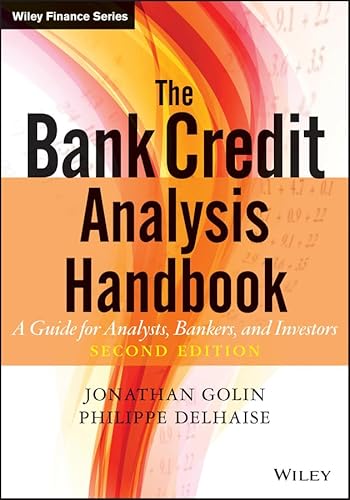The Bank Credit Analysis Handbook: A Guide for Analysts, Bankers and Investors (Wiley Finance)
This comprehensive guide by Jonathan Golin and Philippe Delhaise is a must-read for anyone involved in bank credit analysis. It offers practical insights into the methodologies and practices that define effective credit assessment and risk evaluation in the banking sector. With real-world examples and a focus on critical thinking, it is an invaluable resource for analysts, bankers, and investors alike. Whether you’re new to banking or a seasoned professional, this handbook enhances your understanding of credit risk management, detailing the frameworks that govern it and providing tools for better decision-making.
Structured Finance: Leveraged Buyouts, Project Finance, Asset Finance and Securitization
Authored by Charles-Henri Larreur, this book delves into the intricacies of structured finance, providing clear definitions and explanations of complex structures such as leveraged buyouts and securitization. It serves as an essential guide for finance professionals who wish to deepen their understanding of how capital-raising strategies are crafted in various contexts. The book is especially beneficial for practitioners involved in project finance and offers an up-to-date perspective on recent market evolutions. If you’re looking to expand your knowledge of structured finance, this book should be on your reading list.
Operational Risk Toward Basel III: Best Practices and Issues in Modeling, Management, and Regulation
Greg N. Gregoriou’s insightful book discusses the significant topic of operational risk in banking, particularly as it pertains to Basel III regulations. As the financial landscape continues to evolve, understanding operational risk management is crucial for maintaining robust banking operations. This text is packed with methodologies and best practices, giving readers not just theory but practical insights for real-world application. Whether you are in banking, finance, or regulatory roles, the compelling perspectives offered in this book are essential for anyone keen on adhering to the evolving standards of operational risk management.
The Basel Handbook
This authoritative text by Michael Ong is an essential guide for finance professionals interested in understanding the Basel Accords and their implications on banking operations. The book covers the entire spectrum of Basel I, II, and III, detailing how they influence capital adequacy, risk management, and banking governance. It stands out for its practical take on regulations that shape the global banking framework. Anyone working in the area of risk management and regulation will find this handbook a valuable addition to their library, as it provides a clear understanding of the challenges and solutions associated with compliance.
Better Banking: Understanding and Addressing the Failures in Risk Management, Governance and Regulation
Adrian Docherty and Franck Viort tackle the pressing issues in risk management and banking governance in their eye-opening book. It critiques the failures that led to financial crises and provides actionable strategies for improving risk management and regulatory compliance in banking institutions. This book appeals to both practitioners and students of finance, as it combines theoretical frameworks with case studies and real-life examples. Understanding these failures is crucial for anyone involved in the banking sector, making this an essential read.
Basel III and Corporate Financing: Impact of the Newest Basel III Banking Regulation Accords on Corporate Capital-Raising Strategies
Miryusup Abdullaev’s insightful analysis investigates how the Basel III regulations affect corporate financing strategies. With empirical case studies on major corporations like Deutsche Bank AG and BMW AG, this book offers a nuanced look at how regulatory frameworks shape corporate financial strategies. It is an essential read for finance professionals, corporate strategists, and policymakers who are adapting to the new funding landscape dictated by Basel III. Understanding these implications allows for better strategic planning in an evolving financial environment.
Basel 1: A Short and Exhaustive Guide
For those seeking a concise overview of Basel I, Giacomo Breda’s book provides a clear and thorough introduction to the very foundation of modern banking regulation. Despite its brevity, it covers essential elements that laid the groundwork for Basel II and III. This succinct guide is suitable for newcomers who wish to quickly understand the basic principles of bank capital adequacy and risk management. It’s a great resource for academics and practitioners who need a refresher on Basel I principles.
International Banking for a New Century
This book by Irene Finel-Honigman and Fernando Sotelino presents a forward-thinking examination of international banking practices. As the financial world continues to evolve, this book offers insights into new trends and challenges facing global banking systems. It covers a wide range of topics, from regulatory changes to financial technologies, making it a comprehensive resource for banking professionals and scholars alike. Its forward-looking approach is essential for anyone looking to understand how international banking is adapting to the demands of the 21st century.
Basel 2 and Microfinance
In this detailed exploration by Giacomo Breda and Roberto Salgarelli, the authors tackle the intersection of Basel II regulations and microfinance. As microfinance continues to grow as a powerful financial tool, understanding the regulatory landscape is crucial for those working within this sector. Their book provides insights into how Basel II affects microfinance institutions and what strategies can be adopted for compliance while serving the underserved. It offers valuable perspectives for financial practitioners involved in microfinance initiatives or regulatory compliance.
International Financial Co-Operation: Political Economics of Compliance with the 1988 Basel Accord
Bryce Quillin’s book provides an in-depth look at the political and economic implications of compliance with international banking regulations, particularly the 1988 Basel Accord. It examines how various nations enact compliance protocols and the challenges that arise in a global context. This text is crucial for policymakers, researchers, and finance professionals who wish to understand the international implications of banking regulations on their own financial systems. Understanding these dynamics is essential for anyone involved in international finance.













































